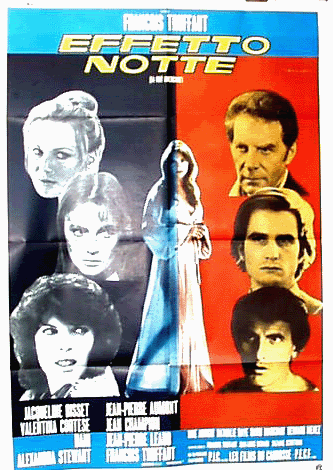Day for Night (Francois Truffaut, 1973)
 Day for Night is a kind of holy grail for people who love auteur theory and metafiction as much as I do (wow, that sounded pretentious). Francois Truffaut directs a film about making a film (May I Present Pamela, the kind of film that Truffaut, at this time, would have scoffed at, but doesn't present it as such) where Truffaut is the director Ferrand, starring, among others, Alphonse (played by Jean-Pierre Leaud, Truffaut's most important actor in real life - and one of my favorite actors ever - with the same name as Leaud's famous character Antoine Doinel's son). Wow. It makes my head spin a little thinking about it, but it flows so well in the movie. This film works just as well if you don't know anything about Truffaut's career, a pretty great feat onto itself. But onto the plot of the film: Ferrand is making a big studio picture, with a washed up star (Severine), a closeted gay older actor (Alexandre), a young, very immature, star (Alphonse) who is in love with a script girl (Liliane, played by Dani, who also played Leaud's lover in Love on the Run), and a British/American actress (Julie) who has had several nervous breakdowns and recently married her much-older doctor. The movie is about the hardships and triumphs of making a movie, and on this production, nearly everything that could go wrong, does. It never feels unrealistic or silly, though; the problems are caused by the personalities of those making the movie. Truffaut is very interested in how important the cinema is, and the fact that film is more important than life to those involved. The movie is certainly more about personalities than a plot - the film itself is contained completely within the filming of the movie. The first shot, a huge crowd scene which is echoed near the end of the film, is gorgeous, and really conveys Truffaut's love of making movies, as well as watching them. That love and joy is what makes this film so brilliant. All subtext aside, this is a portrait of a time in film that really can't be duplicated, where good directors (as Ferrand seems to be) were able to make huge, if not silly, pictures. Ferrand (speaking as Truffaut?!) himself says that Pamela is the end of an era, and now, instead of studio pictures, anyone can take a camera on the street and film. While that isn't really true, it is striking that Ferrand says that, because the French New Wave, of which Truffaut is a leading figure, was pretty much people taking cameras onto the street and shooting realism. This film is a simple, entertaining story, an in-joke, and a piece of metafiction all in one. This is my second favorite Truffaut picture (after Bed and Board), and a must for those who love film. 9/10 RIYL: Wes Anderson (he is clearly very influenced by this film, go carts and all), Godard Labels: 1973, francois truffaut |

Comments on "Day for Night (Francois Truffaut, 1973)"
post a comment